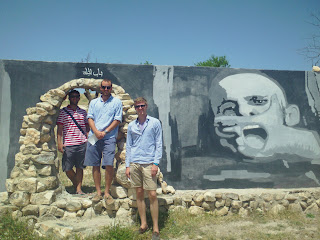Salaam wa laikum! Le bes?
The past few days in Beni Kheddache, my team and I have been meeting with various members of the town with small businesses or small business ideas. As of now, we have heard proposals for olive plantations, fig drying, goat cheese processing, and many other agricultural ideas. One theme which has pervaded these small business brainstorming sessions is the potential that Beni Kheddache has to enter the tourism industry.The problem, however, is that for tourism to work, tourists have to come. Tourism has been one of Tunisia's largest sources of income, but since the revolution, the number of tourists in the country has drastically declined. This became obvious to me today...
This morning my team took the day to travel to Ksar Ghilane in the Sahara desert. After an hour and a half drive, we arrived at the desert frontier, mounted camels, and went on an hour camel ride through the sand dunes. (If you are indeed considering visiting Tunisia, I highly recommend this!). Afterward, we went to the hot spring oasis to rest and eat lunch. While we found the facility to be very welcoming and well-maintained, we were all surprised by the lack of other tourists. Granted there were a few French and probably Swiss travelers swimming (in their speedos :) in the hot spring, but the restaurant in which we ate was nearly empty.
I wanted to bring the topic of tourism up for two reasons. First, tourism gets a worse rap than it deserves, and second, tourism is a practical way for the world to support the current political progress that began in Tunisia and has spread to other countries of the Middle East/North African Region.
Regarding the first point, the idea of tourism is often associated with a bad reputation. Some locals see tourism as a gateway to the slow, Westernization of their community and a gradual destruction of heritage. Too many speedos, too much cultural insensitivity, and too much foreign language butchering, has caused tourists to connote imposition, ignorance, and entitlement. Furthermore, tourists themselves have started to loathe this bad connotation of tourism. For instance, nobody wants to go to a "touristy" place anymore. While these things carry weight, tourism is actually much less of a gateway to cultural destruction than it is a gateway to cultural understanding. Although many of the stereotypes of tourists are true (and for a reason), but they fail to capture the value that tourism can play in exchanging customs and traditions that otherwise would remain unknown. For example, yes a tourist may insist on buying some silly key chain of Tunisia's flag (made in China), but, in the process, he or she may also learn that the Muslim vendor selling it to her descends from a line of Berber tribes that settled on the edge of the Sahara and continue to practice a semi-nomadic lifestyle. This is something that staying home in Switzerland he or she would probably have never learned. Likewise, some locals may resist the idea of tourism, but others, such as those of Tunisia, actually say quite frequently, "bring back the tourists!"
This brings me to my second point. Tourism not only promotes cultural exchange, but it is promotes economic development. While walking around the large empty oasis facility today in Ksar Ghilane, I was almost frustrated that tourists were not there enjoying the wonderful experience and supporting what these Tunisians were offering. I am certainly not saying that this is an obligation of foreigners, but I am saying that is an opportunity - an opportunity for foreigners to learn about Tunisia and to support a country that is attempting to revive itself after a double-wammi of the 2008 economic downturn and the subsequent revolution.
I suppose what I truly want to say is this: If people honestly want to help Tunisia right now, then stop being too good for touristy places and come see something that just might surprise you. Yes, a few Tunisians might try to sell you a cheap key chain or get you to ride a horse for 10 seconds for 5 dinars, but perhaps, somewhere in between you might learn something about Tunisia - maybe that it is NOT the same as Indonesia - that you otherwise would have never known. So, book your flight and come to Tunisia! Or, better yet, come to Beni Kheddache! :)



